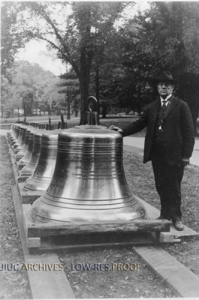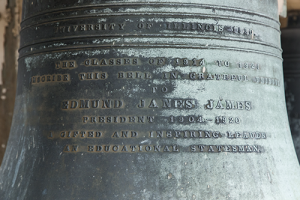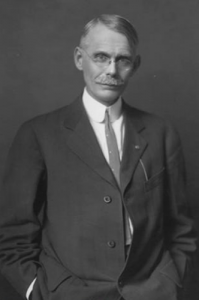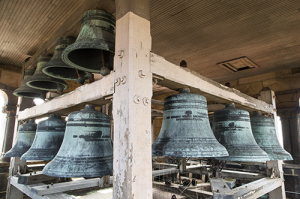100 years ago, music and the resilience of a dream marked the first days of the Altgeld Chimes

Former University of Illinois President Edmund James poses with the Altgeld Chimes before they were installed in 1920.
Perhaps it’s coincidence—and perhaps not—that two of the most symbolic moments in the history of the Altgeld Chimes have come during some of the hardest times in campus history.
Look back to early 1920. A student fundraising drive to purchase chimes for Altgeld Hall had come to a halt. What started out in 1914 as a campaign to create a class memorial for the ages had lost its energy in a devastating 1-2 punch of war and disease. Thousands of Illinois students and young alumni had gone to Europe to fight in World War I; 189 of them were killed. Then, in the closing months of the war, the 1918 influenza pandemic erupted.
Every week for months during the 1918-19 pandemic, which became known as the Spanish flu, the Daily Illini published the names of students who’d died of the virus. Emergency hospitals were set up on campus and overrun with hundreds of patients. Students stopped going to class.
“I don’t feel like the same person, and I haven’t for the last two months. I seem somebody else working in a new world and under new conditions,” wrote Dean of Men Thomas Arkle Clark on October 22, 1918, according to an article in Storied. “We have had a thousand people sick with influenza and nine deaths. There will be others I am afraid too. This is a horrible disease.”
Just a few years earlier, the mood on campus was much more upbeat. This was the golden age of class gifts, and the Senior Memorial Committee of the Class of 1914 wanted to give campus something special. The Class of 1912 had given campus the Eternal Flame; the Class of 1913 had given the Lincoln Hall Gateway.

The largest of the bells in the Altgeld Chimes is inscribed with a dedication to Edmund James.
The Class of 1914 bounced around a lot of gift ideas. According to Liam Flood (BS, ’20, chemical engineering), a former Altgeld Hall chimesplayer who is currently researching the history of the chimes, some of the ideas included a bust of Abraham Lincoln (this was several years before the one was placed in Lincoln Hall) and an electronic scoreboard for the football field. Then came word of a successful fund drive at Ohio State University to buy a chime.
The idea caught the fancy of one Illinois student, Hale Plahn “Pete” Daugherty, the so-called “Father of the Chimes,” who used his position as editor of the Daily Illini to promote the idea to the student body. It was a pricey endeavor, but in March 1914 students voted to team up with future classes to purchase chimes for Altgeld Hall (the Lincoln bust was second place).
A student-led fundraising campaign commenced. By creating a memorial fund that accumulated interest, and by setting up funding collection stations around campus—where a good amount of arm-twisting occurred—the students were gradually approaching their fundraising goal. Then, in 1917, the United States declared war on Germany, and everything changed.
Campus shifted gears for war. Buildings were converted from academic purposes to war training. Students, including members of the chimes fundraising committees, left for the front. The war ended in 1918, but on its heels came the influenza pandemic, and by 1919 fundraising for the chimes had become almost an afterthought.

Former Dean of Men Thomas Arkle Clark insisted on a configuration of bells that could play “Illinois Loyalty.” He also helped find the money for it. (University of Illinois Archives.)
There was one student, however, who had not forgotten the dream for the chimes. In early 1920 Victor Cullin took over the Senior Memorial Committee and electrified efforts to raise money for the campaign. He enlisted additional help from the Class of 1921, and in April 1920 the newly formed Senior-Junior Memorial Committee organized a week-long fundraising blitz. They canvassed campus, hung a campaign poster on Altgeld Hall, and even solicited funds from students who had dropped out, Flood reported.
Within a week they raised $5,000, which was enough for not only the originally planned 11-bell chime, but one with 13 bells. A committee of students and campus officials selected Baltimore, Maryland-based McShane Bell Foundry Co. to cast the bells, and they were about to sign the contract when Dean Clark asked if the configuration of 13 could play “Illinois Loyalty.” When told they could not, he nixed the purchase, and the push for the chimes seemed to hit another rut.
Clark struck a deal with the School of Military Aeronautics, however, which had recently disbanded on campus after the conclusion of the war, to donate some money left over from a campus recreation fund. They used that money for two more bells, for a total of 15, which would allow the chimes to properly play “Illinois Loyalty.” One of the added bells included inscription commemorating the military school’s contribution. The largest bell commemorates former U of I President Edmund James.
On Oct. 30, 1920, during Homecoming celebrations, thousands of students, alumni, faculty, and local community members gathered in front of Altgeld Hall, according to Flood. After speeches, the chimes rang for the first time. McShane representative M. Harry Mettee played “Illinois,” the state song, followed by “Doxology, or Old Hundredth,” “Illinois Loyalty,” “Oskee Wow-Wow,” “Coming through the Rye,” and “America (My Country, ‘Tis of Thee).”
Dean Clark, whose role was just returning to normal, was deeply moved.

The Altgeld Chimes as they appear today.
“It was a beautiful and inspiring experience when the bells pealed out from the old tower,” Clark later wrote, according to “An Illini Place: Building the University of Illinois Campus.” “Many a one who had listened had a mist before his eyes and felt a choking in his throat. To the young there was the vision of the future and what it holds, and to the old there was the recollection of the past and of the thousands who have gone before.”
The scene will be much different on Oct. 30, 2020, when campus celebrates the 100th anniversary of that first day the chimes played in 1920. There will be no crowd of thousands. To maintain safety during the COVID-19 pandemic, the celebration will be a virtual one—except for the chimes players and the Marching Illini, which will appear at Altgeld Hall for likely its only performance of fall 2020.
For those in 2020 who know the history of the Altgeld Chimes, however, and who know about that joyful day 100 years ago when campus emerged from a dark era with peals of music, the centennial celebration will certainly ring a bell.
The Altgeld Chimes: A timeline
1914: Students vote to raise money for chimes for a senior memorial gift.
1920: The Altgeld Chimes play for the first time on Oct. 30, 2020. John William Arnold, senior in mathematics, serves as the first chimesmaster.
1922: A pendulum clock, a gift from the Class of 1922, is added to ring out the time on the chimes.
1931–33: Alice Lauretta Madden, a graduate student, serves as the first woman chimesmaster.
1957: After several years of closure and disrepair, the Altgeld Chimes resume playing thanks to funds from the state and the University of Illinois Foundation’s Altgeld Chimes Restoration Fund.
1958–2017: Albert Emmet “Al” Marien and Sue Wood, who played under Marien, serve as chimes masters from 1958–1994 and 1994–2017 respectively.
2015: The Altgeld Ringers, a registered student organization, forms to play, promote, preserve history, and organize events in honor of the Altgeld Chimes.
2017–18: The Altgeld Chimes receive another tune-up.
Timeline information courtesy of Liam Flood and Tina Horton.